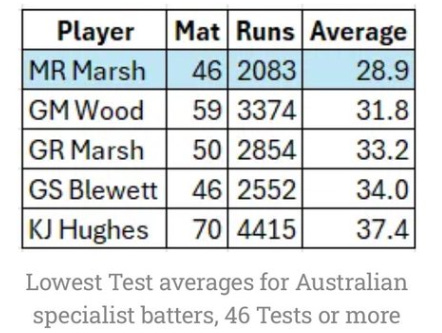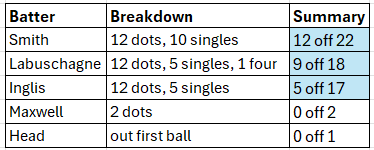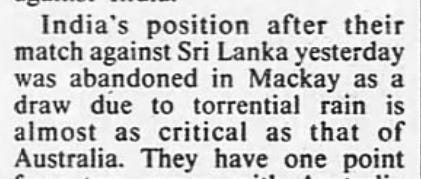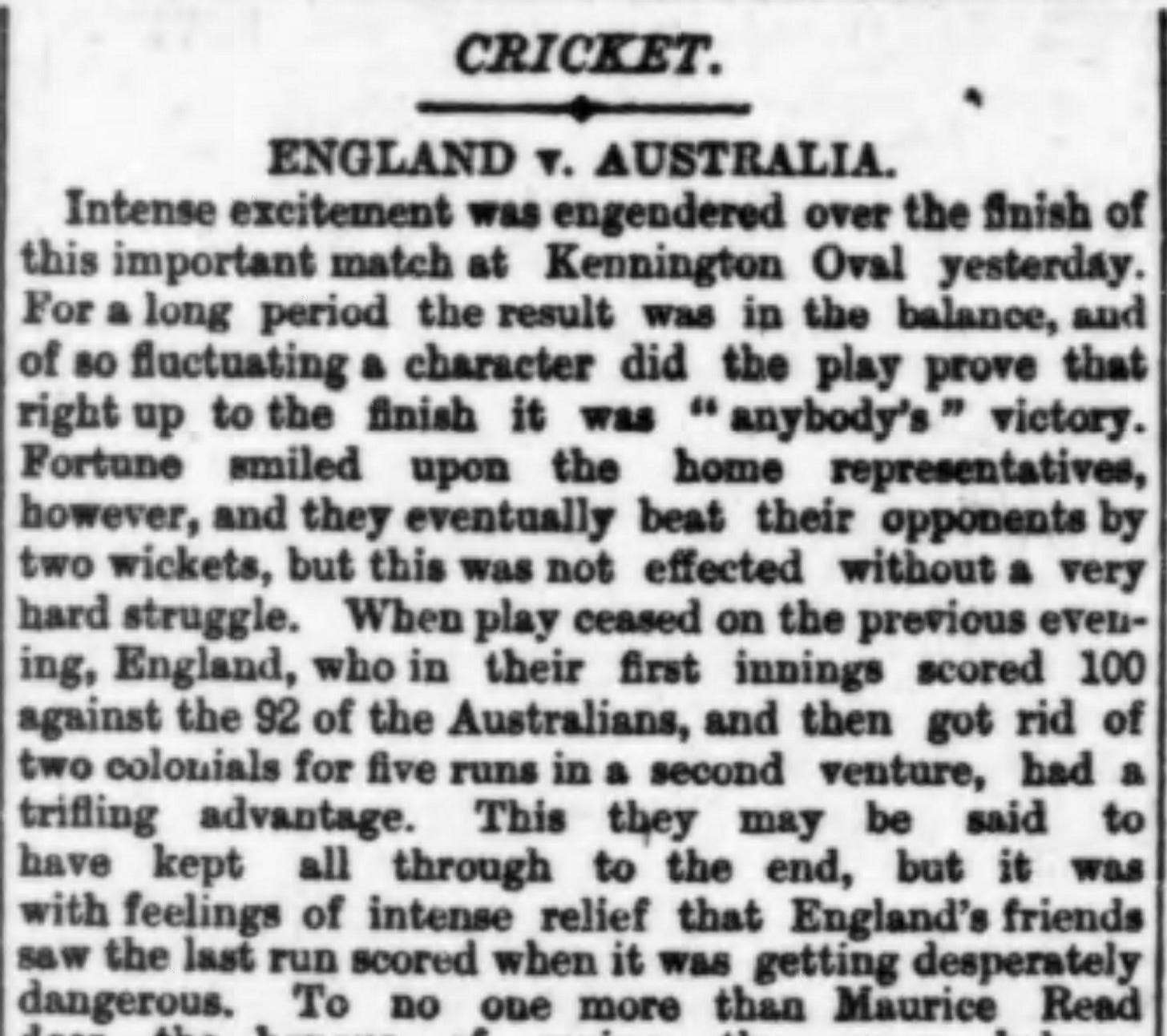Super Over 35
22 August 2025
Ball 1
Well that makes 5 consecutive ODI series Australia has lost to South Africa.
Overall, South Africa has won 9 series to Australia’s 4 - and has a 57-51 lead in head-to-head matches.
Of course, in the same period, Australia has won five of its six World Cups. South Africa has zero.
Australia would say - with some validity - that they deprioritise bilateral ODIs and only tend to pick their best side for the big tournaments.
Nevertheless, it is an impressive record for South Africa. Australia has a winning record over every country in Test cricket and over every other country in ODIs.
The difference is often stark: for example, in ODIs Australia leads India 84-58, England 92-65, New Zealand 96-39, West Indies 79-61 and Pakistan 71-36.
South Africa continue to be a darned good side - and it is really quite remarkable that they have never even been to a World Cup final.
Ball 2
Inevitably, after my criticism last week, Mitchell Marsh has found some form. Clearly, he reads this newsletter!
As soon as Marsh has any success, people want him in the Test side:
I would argue that it is close to the worst shout!
Of players who have played at least as many Tests, no Aussie batter has an average lower than Marsh.
And don’t say he’s an all rounder: he no longer bowls!
There are few players I warm to as much as Marsh: he really does seem like a lovely bloke. But to pick him in Test cricket again would be wrong.
Ball 3
In the first ODI in Cairns, the Aussies collapsed against the spin of Keshav Maharaj.
Someone on Twitter said that when Australia beat South Africa (just!) in the 2023 World Cup, Maharaj had looked dangerous but Steve Smith had kept him at bay.
I decided to check. When Maharaj came on, Travis Head was flying - on 62 from 47 balls. Next ball:
It was the only wicket Maharaj was to take. He bowled well, taking 1/26 off 10 - but it was not the sort of match winning performance we saw the other night.
Steve Smith was indeed a major reason - he withstood 22 of Maharaj’s 60 balls. Marnus Labuschagne and Josh Inglis also made important contributions:
If Smith is in form and if the need is there, Australia should ask him out of retirement to play in the 2027 World Cup.
Ball 4
Well, it was a wait of just over a third of a century, but Mackay has finally been given another chance to stage men’s ODI cricket.
Back in the 1992 World Cup, Mackay’s Harrup Park (now called ‘Great Barrier Reef Arena’) hosted India versus Sri Lanka.
Sadly, only two balls were possible due to rain.
What a disappointment. It is the shortest ODI ever.
Instead of featuring in newspapers around Australia and the world, Mackay did not rate a mention as the match was, understandably, dismissed.
The match is recorded, with humour, on the timeline of the stadium:
Well, Mackay has been given another chance, two in fact.
Tonight, South Africa beat Australia in an ODI and the two teams meet again in Mackay on Sunday.
It only took 33 years, 5 months and 25 days!
Ball 5
In Mackay’s first match, after Aaron Hardie’s first over cost 16 runs, Dan Brettig of the Age/Sydney Morning Herald tweeted:
I agree with him re Webster. It puzzles me that he’s not yet been given a go in Australia’s white ball sides.
His white ball numbers are not amazing but neither are his red ball numbers. Early in his career he was rather average - in the last few years he has been elite. The overall career numbers don’t tell the full story.
He hits the ball hard and true, bowls awkward medium pace and handy spin too. And he is a brilliant catcher.
Hardy, Abbott, Dwarshuis and others are all okay but I can’t see them in the side for the 2027 World Cup. I can see Webster there though - they should give him a go!
Ball 6
August is a time for anniversaries of Ashes series in England: this year, most notably, marks 20 years since the extraordinary series of 2005.
It might have escaped your attention that it is also the 135th anniversary of the Ashes of 1890!
1890 was the eighth ever Ashes and also the eighth and final series that England won in its greatest ever consecutive winning streak. (Australia matched this from 1989 through to 2002/03: England’s win in 2005 stopped them from making it a record nine in a row.)
In other words, back in 1890 Australia had never won the Ashes.
Having lost the first of a planned three-Test series, Australia went perilously close to squaring the ledger in the second Test at the Oval. But England prevailed: set 95 to win, they crept across the line, making 8/95, thus retaining the Ashes.
The Test finished on the second day: 12 August 1890: 135 years and 10 days ago.
The third Test was washed out without a ball being bowled and so even if Australia had won the second Test, England would still have retained the Ashes.
Not that this was really a thing. The term, ‘the Ashes’ had largely fallen out of use, (it began a revival in the series of 1903/04) and even the definition of a ‘Test match’ had not yet been established, (that was to take place in the ensuing few years).
Here is the beginning of London’s Daily Telegraph’s report - note the headline says ‘England v Australia’ not ‘the Ashes’ and that the copy refers to ‘this important match’, rather than a ‘Test match.’
As was usual back then, they were not overly bothered about paragraphs and white space for ease of readability!
And here is the finish of the article. Even in supposedly staid and uptight Victorian England, ‘there was a scene of great excitement at the finish, the crowd massing in front of the Pavilion, where they called for their favourites.’
You might also have noticed it referring not to the winning run but to the ‘winning notch’.
‘Notch’ was an old fashioned term for run - that came from the early practice of cutting or ‘notching’ a mark on a piece of wood to keep score.
It had largely vanished by 1890, (the rest of the article uses runs) - evidently the author thought the decisive moment deserved a little literary flourish!
Anyway, happy 135th Birthday to the 1890 Ashes!










